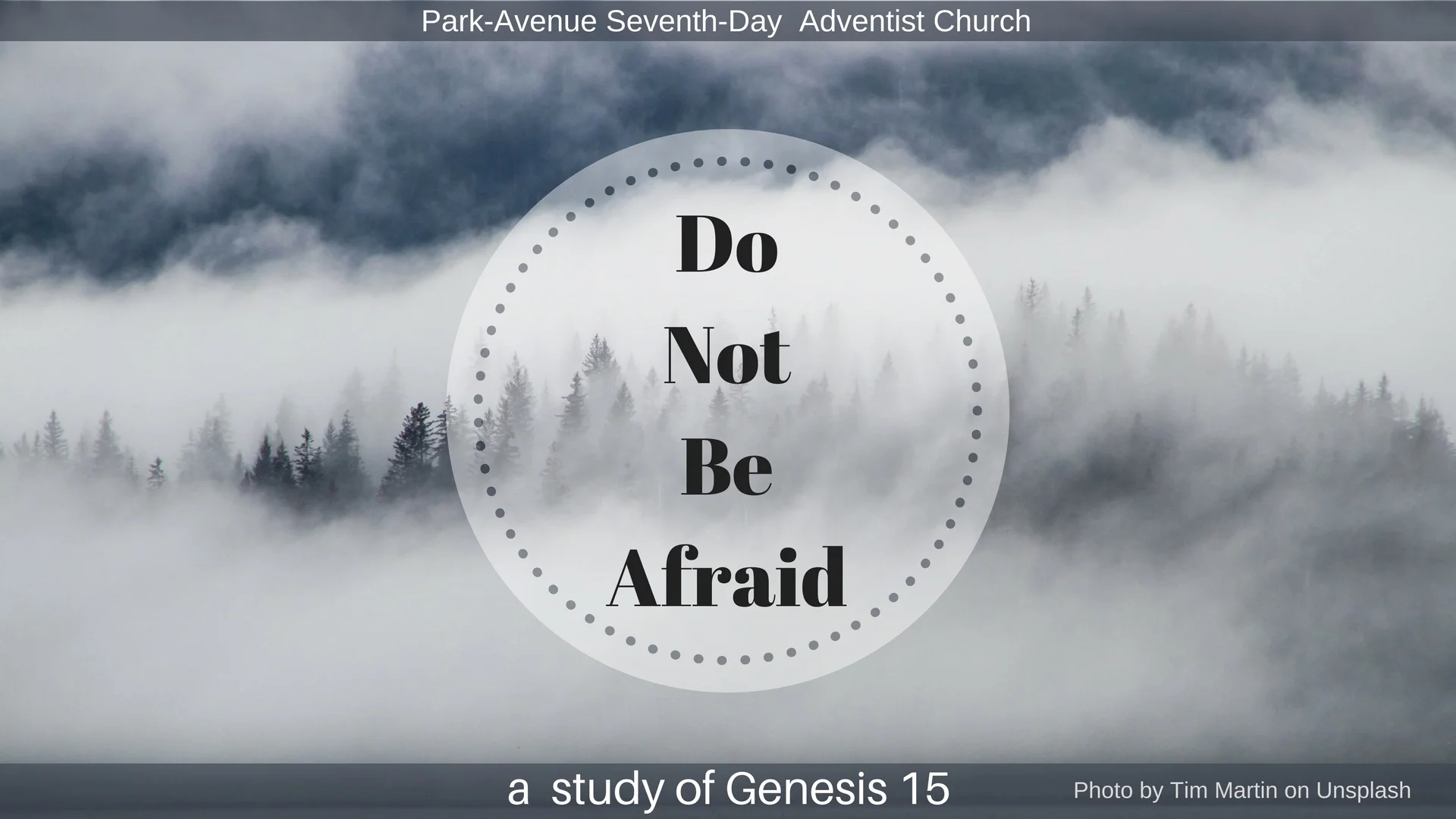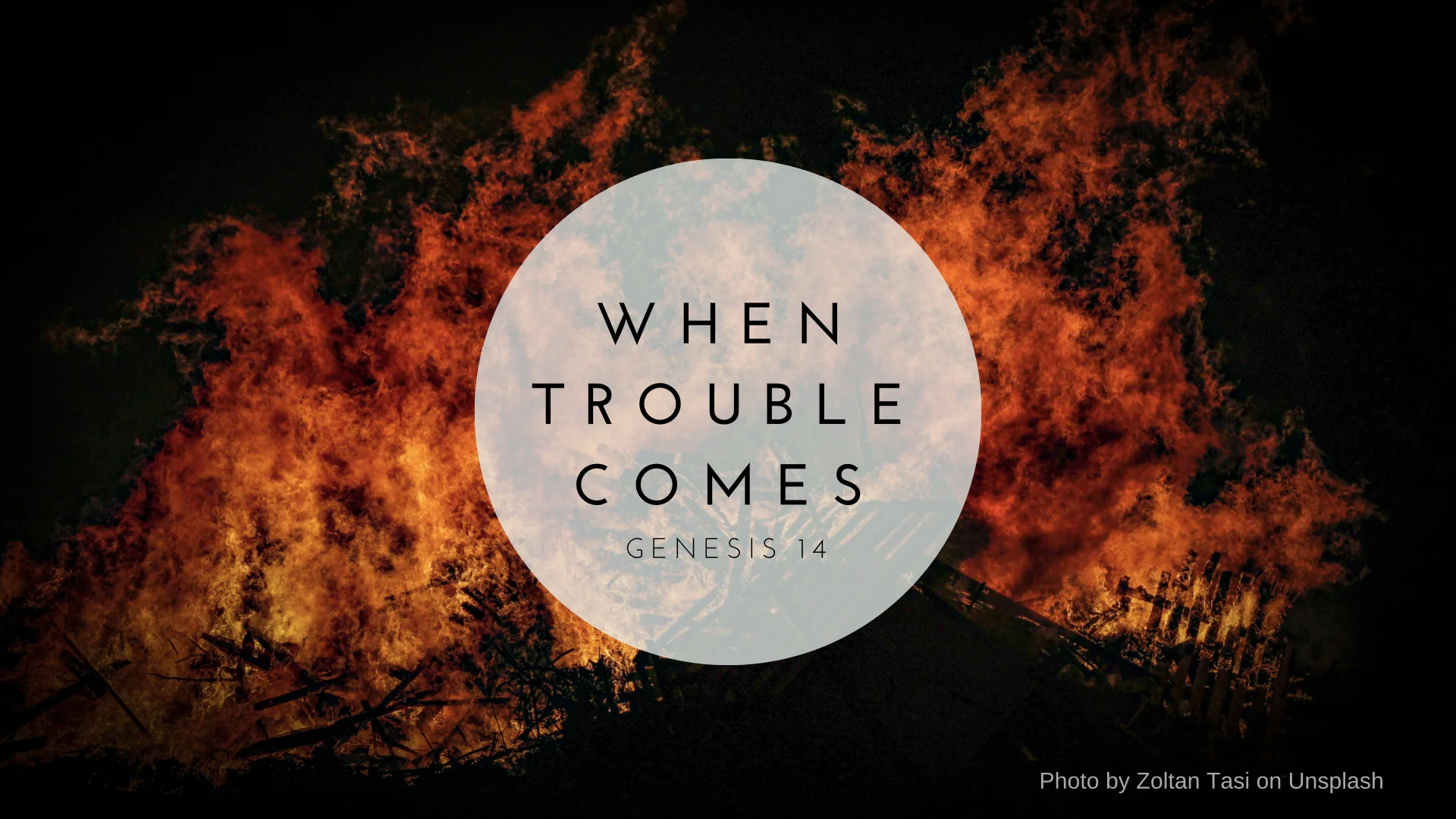Do Not Be Afraid
Genesis 15 is the literary center of the whole book of Genesis, some even consider it the very heart of the Abram story. (Westermann, Genesis 12-36, 230) It is in Genesis 15 that God formalizes the covenant He initiated with Abram when He called Abram from Ur (Genesis 12).
Abram and his household had just witnessed the carnage of war (discussed on my previous post). Since Abram was a man of peace who sought to avoid conflict I believe the violence and bloodshed he, and his household, witnessed must have been traumatizing. In this context God comes to Abram in a vision.
The word of the LORD
The phrase "The word of the LORD" occurs only twice in Genesis and both on this story (verses 1, 4). This phrase however is often seen in the Old Testament (Jeremiah, Ezekiel, Jonah, Haggai, Zechariah, etc.) and its use in this story establishes Abram as a prophet.
The very first things God says to Abram is
Do not be afraid,
This may seem like an odd statement at first glance. Abram had defeated the enemy, Sodom and Gomorrah owed their freedom and possessions to him and his neighbors were his allies. What would Abram be afraid of?
I believe Abram was still shaken up from the previous battle and could use divine comfort. As we read the text we realize Abram was mostly concerned regarding his future, but we will talk more about that in a bit.
God not only tells Abram to not be afraid, He reminds Abram that He is his shield and his exceedingly great reward (Genesis 15:1)! I would expect Abram to be fine after hearing these words from God Himself! But Abram questions God asking
Lord God, what will You give me, seeing I go childless...
At the heart of Abram's concerns we find his lack of offspring or seed. God has clearly promised Abram innumerable descendants, but so far Abram had none. Abram believes at this rate one of his servants will have to be adopted and will become his heir. But God clarifies on Genesis 15:4 that his heir will come from his body. God then brings Abram outside and tells Abram to look at the stars and count them, if he is able. God tells Abram that his descendants will be just as numerous.
Righteousness by Faith
Verse 6 is very special because there the biblical text describes Abram's response as belief or trust in the Lord. The Hebrew construction used here means "to place trust in someone with confidence... the general idea is reliance." (Mathews, K. A. Genesis 11:27-50:26. Vol. 1B, Broadman & Holman Publishers, 2005. p166)
The text emphasizes that Abram entrusted his future to what God would do for him as opposed to what he could do for himself to obtain the promises. (Matthews, 166)
As a consequence of Abram's belief, God credited/reckoned/counted his faith as righteousness. God assigns Abram's faith the value of righteousness. God graciously declares Abram righteous, because Abram relies on God. Abram's righteousness or right standing before God is not related to any right doing, Abram did not earn his righteousness by obeying any law, but rather by entrusting his future to what God would do for him, to what God promised to do for him.
Righteousness by faith is not something new that shows up in the New Testament, rather it is found right here, in the heart of the book of Genesis.
It is not the human effort and works that produce righteousness; instead, righteousness is a gift from God. (Doukhan, Jacques. Genesis. Pacific Press Publishing Association, 2016. p222)
How shall I know?
Right after Abram believes and God counts it as righteousness we have God promising Abram land as well and Abram asks God "how shall I know that I will inherit it?"
Abram had just believed, one verse earlier Abram was believing, is he doubting now?
But God, patiently, works with Abram giving him detailed instructions on what to do next.
So He said to him, “Bring Me a three-year-old heifer, a three-year-old female goat, a three-year-old ram, a turtledove, and a young pigeon.” Then he brought all these to Him and cut them in two, down the middle, and placed each piece opposite the other; but he did not cut the birds in two. And when the vultures came down on the carcasses, Abram drove them away. (Genesis 15:9-11 NKJV)
These verses are pretty weird, at least I always thought so as I would read through it in the past. But one of my favorite parts of doing this series is trying to understand the texts that strike me as odd.
The only other scripture that mentions anything similar to this is found in Jeremiah 34:18-20 other than that the Bible has nothing else that is similar to this. However, outside the Bible, scholars have found similar rituals.
"This imprecatory aspect of the symbolic slaying has parallels with Assyrian and Aramaic vassal treaties of the first millennium." (Matthews 172)
We will come back and explain this further in a bit, but before that I would like to address what God reveals to Abram on Genesis 15:13-16.
God gives Abram a glimpse of things to come. God reveals to Abram that even though His promises are faithful and true, it will not be a smooth as Abram might want to believe. There will be suffering and slavery and persecution and wars. But God will be with his descendants through it all.
This portion reminds me of portions of Isaiah, Daniel and Revelation that have beautiful descriptions of what God has in store for those who love Him, but also include descriptions of struggles. The presence of difficulties is not evidence that God has forgotten us, He told us ahead of time so that we would not lose heart. Abram was told that there would be challenges, but the promise would still come true.
The same is true with Jesus' second coming. Things will get tougher before they get better, but God's promise stands true. Those who love God will inherit the New Jerusalem (Revelation 21:1-2). Jesus talks about this in Matthew 24-25.
There is so much I could say here and I cover it in more detail on another post available here.
I do wish however to highlight Genesis 15:16b
"...for the iniquity of the Amorites is not yet complete.”
Abram's descendants will not come in to possess the land, they will not receive their promised land until the iniquity of the Amorites is complete. The promised land is a blessing to Abram's offspring, but as they receive their land, it simultaneously becomes a judgment for the poeples who inhabit it. Those who inhabit the land will have 400 years to make up their mind regarding who they will worship. They are currently being exposed to Abram and His God. Due to Abram's recent military involvement (Genesis 14) many are aware of his presence and his God. God is giving them time to decide, God is giving the inhabitants of Canaan 400 years to turn to Him.
A New Testament passage that clearly mirrors this is found in 2 Peter 3:9
The Lord is not slow to fulfill his promise as some count slowness, but is patient toward you, not wishing that any should perish, but that all should reach repentance. (English Standard Version)
God delays the reward of those who love Him because of his love and mercy towards those who have not yet accepted Him.
Smoking oven and burning torch
Now we return to finish explaining the odd ritual initiated in Genesis 15:9-11.
And it came to pass, when the sun went down and it was dark, that behold, there appeared a smoking oven and a burning torch that passed between those pieces. (Genesis 15:17 NKJV)
Most agree that the smoking oven and the burning torch mentioned in Genesis 15:17 represent God, based on Exodus 13:21-22 where God is described as going before the children of Israel as a pillar of cloud during the day and a pillar of fire during the night.
I like the following explanation give by Dr. Doukhan,
Many Ancient Near East texts explain the reason why the covenanter walked between the two parts. The action signifies the identification of the one walking between the pieces with the cut animals themselves.
One testimony of this rationale is found in the covenant of the Assyrian king Ashur-nirari V with his vassal Mati-ilu. After Mati-ilu cuts the head of the ram, the king says: "This head is not the head of the ram, but the head of Mati-ilu ... If Mati-ilu violates the oath, as the head of the ram is struck off, ... so will the head of Mati-ilu be struck off." (Doukhan, Jacques. Genesis. Pacific Press Publishing Association, 2016. 224)
What does all this mean?
God is willing to pay the penalty for the breaking of the covenant. God is willing to die.
Conclusion
God promised Abram descendants and land and even though it will take a while and there will be struggles, ultimately it will happen. Not because of Abram's obedience, but rather because of God's love. God who promised also guarantees the fulfillment.
Abram witnessed the presence of God passing between the pieces of the slain animals and he understood what it meant. Today we look back on the cross and understand what it meant. If God was willing to send His only Son to die for us while we were sinners and without us deserving it. He will keep all of His promises including coming again.
He who testifies to these things says, “Surely I am coming soon.” Amen. Come, Lord Jesus!
Revelation 22:20 ESV







